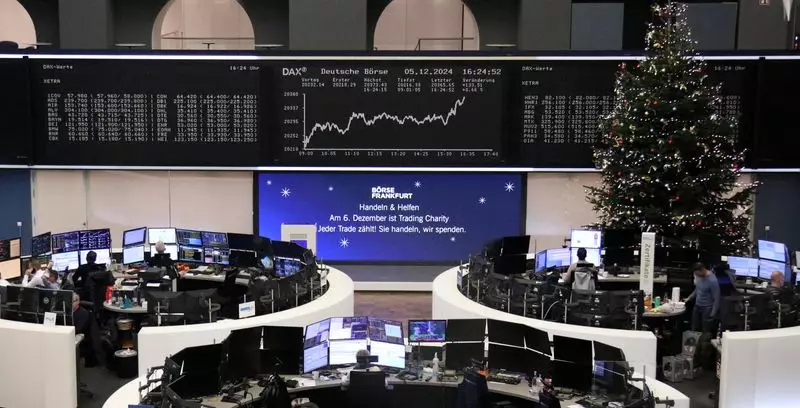European stock indices exhibited a slight decline on Thursday, reflecting investor apprehension regarding an impending rate adjustment by the European Central Bank (ECB). The pan-European STOXX 600 index, which initially witnessed a positive start, ultimately fell by 0.1%. This drop comes as traders and analysts alike remain keenly attentive to the evolving economic landscape of the euro zone, marked by sluggish growth and persistent political uncertainties. Notably, sectors such as retail struggled, while automakers managed to post gains, showcasing a mixed market sentiment.
The prevailing anticipation surrounding the ECB’s monetary policy decision has intensified, with market participants estimating a staggering 81% likelihood of a 25 basis points cut in interest rates, alongside a 19% probability of a more aggressive 50 basis points reduction. This speculation stems from the euro zone’s inflation nearing its target, juxtaposed against the backdrop of a decelerating economy. Investors are eagerly awaiting the ECB’s announcement, scheduled for 1315 GMT, which may set the tone for financial markets in the near term.
In contrast to the euro zone, Swiss equities experienced a boost following the Swiss National Bank’s decision to slash interest rates by 50 basis points. This marks the most significant rate reduction in almost a decade, designed to preemptively align with anticipated cuts from other central banks, thereby stabilizing the Swiss franc’s trajectory. Market analysts, including Marija Veitmane from State Street Global Markets, have voiced concerns regarding the pace of rate cuts in Europe, suggesting that they are insufficient given the current economic conditions. According to Veitmane, “The economies are slowing and the central banks are really trying to catch up,” a sentiment that encapsulates the frustrations of investors in an environment of increasing divergence between U.S. and European markets.
While the STOXX 600 remains significantly below its historical peaks, it has recorded a modest 8.5% increase year-to-date, starkly contrasting the robust 27.6% gains of the U.S. S&P 500. This disparity highlights the challenges that European stocks face in gaining investor confidence. In terms of individual stocks, SThree Plc, a UK-based recruitment firm, saw its shares plummet by 26% following a profit warning linked to challenging hiring conditions amidst the broader geopolitical and economic volatility plaguing Europe. Conversely, Diageo Plc experienced a 3.8% uplift after UBS elevated its rating from “sell” to “buy,” bolstered by positive signals regarding its American operations.
Additionally, Swiss contract pharmaceutical manufacturer Lonza witnessed a notable 6.1% rise driven by its strategic decision to exit the capsules and health ingredients segment, reflecting a corporate pivot in response to market dynamics.
As European markets navigate through a tumultuous economic landscape, the trajectory of stock performance will be heavily influenced by forthcoming policy decisions from the ECB and other central banks. The interconnectedness of economic data and central bank actions means that investors must remain vigilant, adjusting their strategies to align with the evolving financial climate. With challenges aplenty, including geopolitical tensions and macroeconomic fluctuations, stakeholders in the European market will be closely monitoring developments to gauge their potential impacts.

